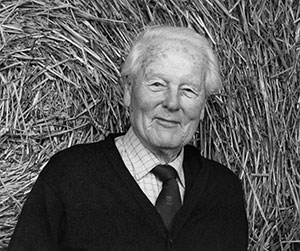Penny Johnstone met Val Bailey at his home in Lower Holditch. This is Val’s story:
‘Born into a fourth generation army family in Edinburgh, I was destined for Wellington, Sandhurst and the Black Watch. My destiny changed dramatically when, at 13, I decided I’d prefer to go into the Royal Navy. I knew nothing about it and the only warship I had seen was from my prep school at Seaford overlooking Beachy Head in Sussex. However, I was rushed through the system and sent to Dartmouth Naval College in 1933.
My father lost all his money around this time – he had it in a private bank that went bust – and became a courier for Sir Arnold Lunn, who really started package tours. School holidays were wonderful; I used to join him wherever he was in Europe. If I wasn’t with him I spent time with my mother and stepfather, going to amazing parties; their friends were racing drivers and pilots so I had a lovely time driving around in Barnarto’s Bentleys and Kindersley’s aeroplanes!
Dartmouth was exactly like a public school, but just a bit harsher I think. I was physically beaten regularly, but never resented it. It was part of a disciplinary system that doesn’t exist any more but there was a reason for it: if you were dealing in ships, there were damn great bits of rope and wire hanging around and you had to be constantly alert and to have what we called the seaman’s eye. The whole time you were scanning, so as not to miss the man overboard, funnel falling down and so on.
When I passed out from Dartmouth at 17, I took part in the Coronation Fleet review with about a thousand ships in the Solent, before being posted to the West Indies. Then followed blockade patrol for the Spanish Civil war and two years as midshipman in a cruiser on the South Africa station. That was a very glamorous life: lots of hospitality on board, flags on the quarter deck, bands playing and so on. I still love Sinatra and big band music, which I think of as part of my life.
Then it was back to England, and as a 19 year old, when war broke, I set off for the Mediterranean in a destroyer. We were one of the escorts to the aircraft carrier Ark Royal at Mers el Kébir, and saw action at Oran. At last we were doing what we had been trained for. The camaraderie was terrific: you made friends and experienced things you can’t replace by going across the North Sea in a little boat, or climbing Everest. We didn’t think in terms of challenges; you just woke up in the morning and wondered what would happen that day.
I volunteered to fly, trained in England, and joined Ark Royal in 1941, flying Fairey Fulmars. They were fine at the time, but they could only do 247 knots vertically downwards so were no match for the Japanese Zeros. The Ark sank when I had been on her for about three months. We were torpedoed at twenty to four in the afternoon and didn’t sink until ten to six in the morning. So she just filled and slowly rolled over. I was the last chap off. The ship was horizontal, so we just walked into the water and off we paddled into the night’s ocean. It was a moving moment.
After the war I was grounded because I got vertigo and lost my physical balance. I married June, my wife, and we had two and a half lovely years in Washington DC, where our daughters were born. I then served at the Admiralty and in Argentina, (where as a naval officer I was privileged to indulge my passion for polo relatively cheaply) before my final posting as the Commodore of the barracks in Plymouth.
I left the navy in 1968, and with June’s wholehearted support bought Lower Holditch farm with 50 acres, for our first foray into farming. The Earl of Devon’s farm manager, to whom I was introduced, was breeding South Devon cows on the same acreage and after talking to him I decided to follow suit. So I found myself overnight – with the wonderful Fred Beeching as stockman, who, with his wife, used to tolerate my lack of knowledge with smiles – wrestling with damn great animals. The shock and actual physical hard work, including pulling calves out of cows and building the farm unit, were followed by the pride and satisfaction of establishing a new life.
It was a great transition, and a marvellous way of changing completely from never having got my hands dirty except on a bridle. I was very much the apprentice, with all the farmers longing to tell me how to do it, and I’ve never regretted my decision. My first and continuing impressions of those times and subsequent years were the kindness of my neighbours and the help they all gave to an interloper. My farming was made possible first by the patience of one of these neighbours, Jack Turner, subsequently by his son Leslie, and if I last that long, by Andrew, the third generation.
It is hard to overestimate the pleasure of good neighbours and the satisfaction of knowing that after a lifetime of travelling the world, Lower Holditch in England’s West Country is the best place to live. My house is 500 years old and I love the fact that when I look out of the window, although the glass has changed, I am looking through the same hole in the same wall that generations of farmers have looked through.’








